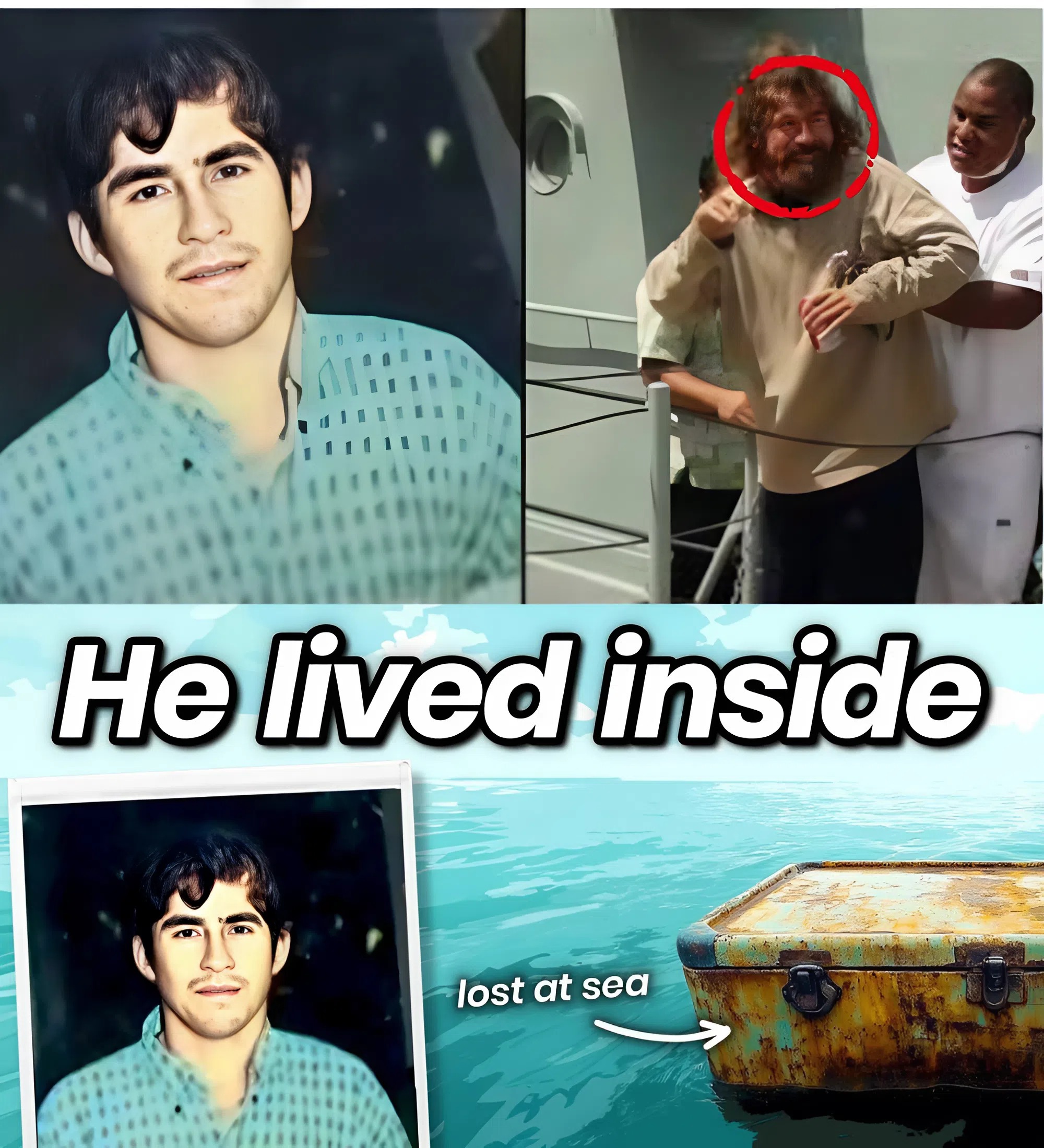The Storm That Should Have Killed Him
It began like any other morning off the Brazilian coast — calm, humid, with the promise of a good catch. João Pereira, a 43-year-old fisherman from Pará, had spent his life reading the sea like a book. He knew its moods, its rages, its silences. But nothing could have prepared him for what was about to unfold that day.

At 7:40 a.m., the radio crackled — static, then silence. Within minutes, the wind howled like a beast. The ocean that had fed him for decades suddenly turned predator. Waves rose like mountains. João’s small wooden boat, Esperança, snapped in two under the weight of the storm. His last memory before the sea swallowed him was the sound of splintering wood and his own scream lost in the roar.
When he came to, he was floating among debris — planks, nets, a broken bucket. The horizon was endless gray. He shouted for help until his throat tore, but only the wind answered. Then, through the rain and foam, something slammed into his shoulder — a dented, rusted industrial refrigerator, likely thrown overboard years before by a cargo ship.
It was, quite literally, the coffin that would become his home.
The Coffin That Kept Him Alive
At first, he saw it only as salvation. He clung to its handles, desperate to stay afloat. But as hours turned into days, João realized that this refrigerator was not just a piece of trash — it was his only chance at life.
He pried open the door and crawled inside, balancing his weight carefully so it wouldn’t capsize. The walls stank of old fish and rust. Inside, it was dark, humid, and suffocating — yet it shielded him from the sun and the relentless spray of saltwater.
He survived by catching tiny fish that got trapped inside when waves filled the box. When it rained, he collected droplets that dripped through the cracks. Some nights he swore he heard voices — whispers rising from the water like prayers, or warnings. The isolation began to corrode his mind as much as the salt corroded the metal.
Every morning he would mark the inside wall with a piece of shell — a ritual, a reminder that time still existed. But soon, even counting became meaningless.
“I stopped thinking in days,” João later said in one of his few interviews. “I only thought in heartbeats.”
When the Sea Becomes Your Only Friend
By the third month, João’s body was unrecognizable — his skin blistered, his beard tangled with salt, his eyes sunken and haunted. But something inside him had shifted too. The sea, once his enemy, became his companion. He began to talk to it.
He gave names to the waves. He whispered stories to the moon reflected on the surface. He believed — or maybe just needed to believe — that the ocean was listening.
“There were moments when I thought the sea was protecting me,” he said. “Like it wanted me to stay.”
He learned to predict the tides, to hide from the scorching sun under the lid, to rest only when the stars aligned overhead. He began to dream — not of rescue, but of strange lights beneath the waves, glowing shapes that swam silently beneath his floating tomb. Once, he claimed, a shadow “as big as a mountain” circled the refrigerator for hours. “It was watching me,” he whispered. “And I think it spoke.”
Those who heard that part of his story dismissed it as delirium. But João insisted that the sea wasn’t empty — that something down there wanted him alive.
400 Days of Silence
The world forgot João Pereira. His family held a memorial service after three months. His name was carved on a small wooden cross near the dock where he used to tie up Esperança. Life went on without him.
But João didn’t die. Against every law of nature, he drifted across the Atlantic, carried by currents and storms, living off the scraps of life the ocean reluctantly offered him. Seabirds landed on his refrigerator; some became food, others companions. Once, a passing freighter nearly ran him over — but no one saw the man screaming from the waves.
Until one morning, off the coast of Suriname, a group of local fishermen spotted something white bobbing in the water. They thought it was debris. When they drew closer, the stench hit them first — a mix of salt, decay, and something else they couldn’t name.
Then, the lid moved.
The Day They Opened the Lid
When they pried open the refrigerator, what they saw silenced them.
Inside was a man, skeletal and sunburned, his hair white from salt, his eyes wide open. He was still breathing. Barely. Wrapped around his wrist was a rosary made of fish bones and string. Written on the inside of the lid, in uneven scratches, were hundreds of marks — and one message in Portuguese:
“O mar escolhe quem ele devolve.”
(The sea chooses whom it returns.)
One of the fishermen, still shaking, told reporters later:
“I don’t know how he was still alive… but what he said next wasn’t human.”
When João regained consciousness, the first words out of his mouth weren’t thanks or relief. He whispered, “Don’t take me back.”
They thought he was delirious, terrified of hospitals. But when they tried to bring him to shore, he began to cry violently, screaming that “the coast is watching.” No one could calm him until he passed out again.
The Man Who Feared the Land
Doctors in Paramaribo confirmed that João was severely dehydrated, malnourished, and in shock — yet miraculously free of infections. When asked how long he thought he had been drifting, he simply said, “Too long.”
As news spread, scientists and journalists descended on him, eager for his story. Survival experts called it impossible. Oceanographers said the currents could have carried him that far — but no man could survive it. João only smiled when asked how he managed.
“The sea doesn’t let go if it’s not done with you,” he murmured.
But what truly unsettled those who met him wasn’t his survival — it was his fear. Even after months of recovery, João refused to step outside when it rained. He slept with the refrigerator’s lid beside his bed. When asked why, he told one nurse:
“When you’re alone out there long enough, you start hearing the truth. The sea talks. And when you finally understand what it’s saying… you can’t unhear it.”
He never explained what he meant. But in his final recorded statement before vanishing again — yes, vanishing — he left behind a warning scribbled on a napkin:
“There’s something out there. It’s not the sea. It’s what the sea hides.”
The Legend of the Refrigerator Man
Today, João Pereira is both a miracle and a mystery. Some say he went mad and fled inland after his release. Others claim he returned to the ocean, unable to resist its call. A few fishermen swear they’ve seen a small white box drifting again near the equator, with a man sitting inside, staring at the horizon.
His story has inspired documentaries, novels, and endless online debates. Scientists dissect his survival; believers quote him as a prophet of the deep. But no one can explain the symbols carved inside the refrigerator, which oceanographers say match ancient maritime markings — warnings used centuries ago by lost sailors.
What He Saw Beneath the Waves
So what did João see? No one knows for sure. But one chilling clue comes from a diver who examined the refrigerator after it was recovered. Along its rusted bottom were strange, parallel scratches — too precise to be caused by rocks or coral. They looked like marks from claws.
The diver, who requested anonymity, said


